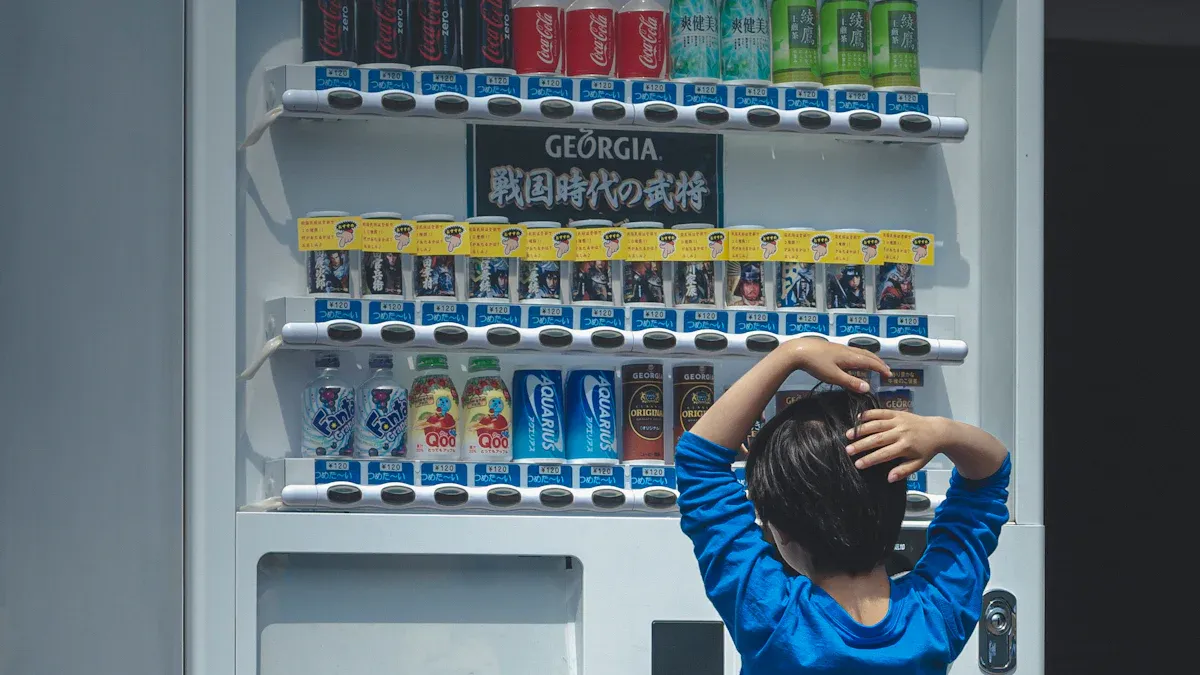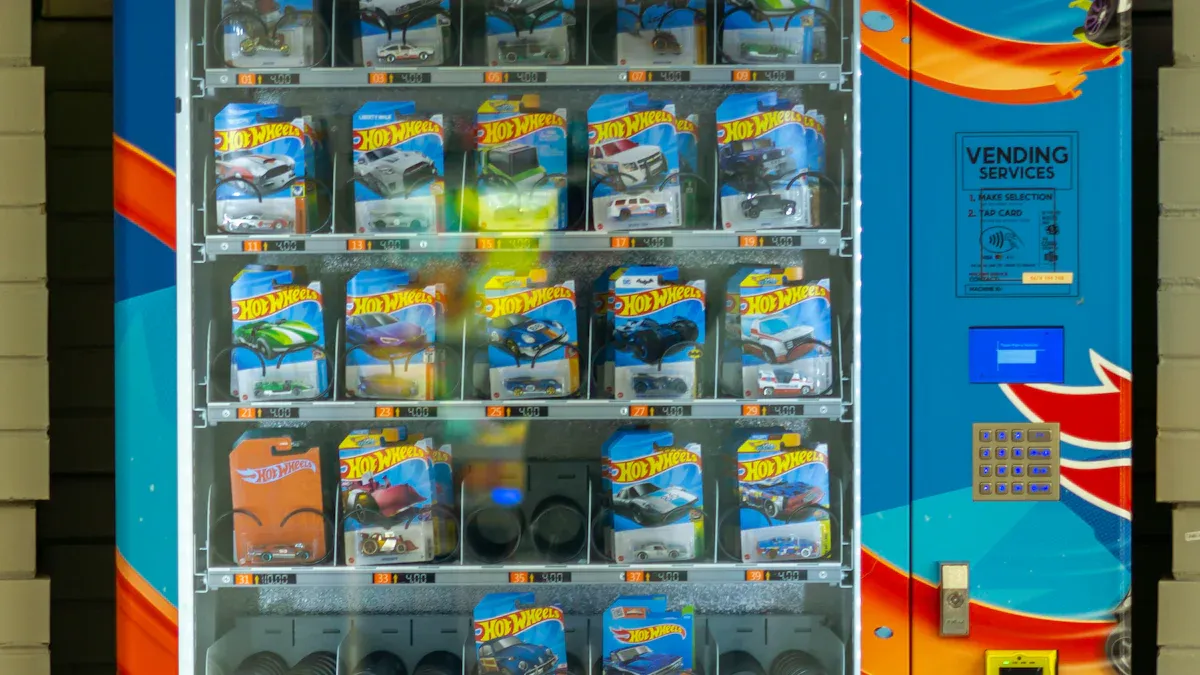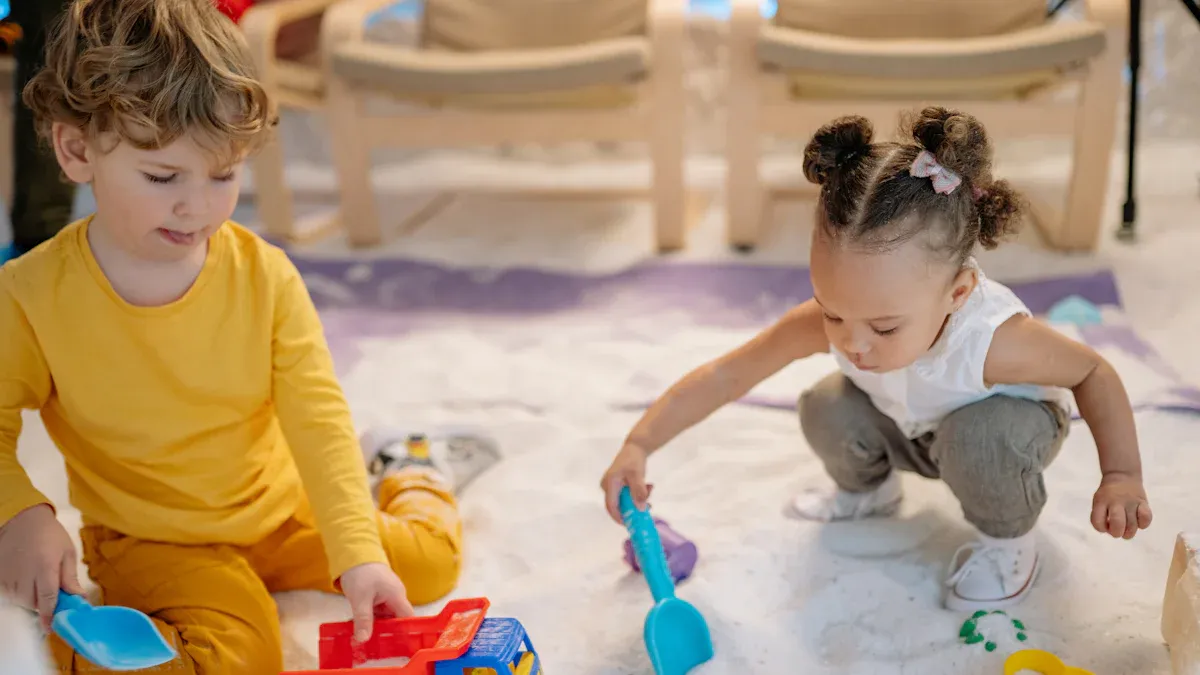How Toddler Vending Machines Enhance Developmental Skills Through Play

You want your child to grow and learn while having fun. Toddler vending machines give your little one a chance to build important developmental skills through hands-on play. Kids who use interactive toys like these often show better language, cognitive, and fine motor abilities. Research shows that higher quality interactive experiences boost learning for children as young as 23 months. When you choose play that encourages imagination and exploration, you help your child thrive.
In recent years, almost all American families have smartphones at home.
Many children spend over two hours a day on screens.
High-quality interactive play links to stronger developmental skills in toddlers.
Key Takeaways
Toddler vending machines promote hands-on play, helping children develop fine motor skills and cognitive abilities.
Imaginative play with these machines encourages creativity, problem-solving, and social skills like sharing and empathy.
Engaging in playtime with your child strengthens your bond and enhances their learning experience.
Limit screen time and choose interactive toys to create a rich, educational environment for your child.
Every play session with a vending machine builds your child's confidence and independence through fun learning activities.
What Are Toddler Vending Machines

You might wonder what makes toddler vending machines so special for your child’s playtime. These toys look like real vending machines, but they’re designed just for kids. When you bring home a shop & go vending machine, you give your child a hands-on way to explore, learn, and have fun.
Interactive Features
Let’s take a closer look at what you’ll find in a typical toddler vending machine:
Feature | Description |
|---|---|
Engaging Toy | 19-piece set that mimics a real vending machine. |
Developmental Skills | Teaches sorting, letter and number recognition, cause and effect. |
Interactive Elements | Includes play food, number/letter codes, pay slots, and a collection drawer. |
Age Appropriateness | Suitable for children ages 3 and up. |
Additional Features | Reusable activity card and option to stock with home toys/food packages. |
No Assembly Required | Ready to use out of the box, no batteries needed. |
You’ll notice that every piece stores inside the vending machine, making cleanup easy. The materials are safe for kids, with rounded edges and non-toxic plastics. These machines meet strict safety standards, so you can relax while your child plays.
Tip: Encourage your child to sort, match, and count the pieces. This helps build fine motor skills and supports early learning.
Imaginative Play Opportunities
Toddler vending machines open the door to imaginative play. Your child can pretend to run a store, sell snacks, or buy treats. This kind of play acts like a sandbox for problem-solving. Kids face imaginary challenges and come up with creative solutions. They practice empathy and communication by acting out different roles.
Pretend play helps your child experiment and learn.
Imagination grows stronger with practice, just like a muscle.
Kids learn to think flexibly and approach problems from new angles.
When your child uses a toddler vending machine, they don’t just play—they build important skills for life.
Developmental Skills Enhanced

Fine Motor Skills
You want your child to have strong hands and fingers for everyday tasks. Toddler vending machines make this possible through play. When your child picks up coins, slides them into slots, and pushes buttons, they build hand muscles and improve hand-eye coordination. These actions help your child gain independence and focus.
The Melissa & Doug Wooden Vending Machine encourages your child to manipulate small objects, which strengthens fine motor skills.
The Take Along Toolkit offers a 24-piece set designed for small hands, helping your child practice grasping and moving pieces.
Pull-Back Construction Vehicles teach cause and effect while boosting motor skills and coordination.
100 Wooden Blocks let your child stack and build, improving dexterity and color or shape recognition.
Pattern Blocks and Boards promote spatial awareness and problem-solving as your child explores shapes and colors.
You can see your child’s confidence grow as they master these movements. Every time they use a shop & go vending machine, they get better at tasks like zipping a jacket or holding a pencil.
Cognitive Growth
You want your child to think, solve problems, and understand the world. Toddler vending machines support cognitive growth by offering hands-on learning. Your child sorts, matches, and counts pieces, which helps them recognize numbers, letters, and colors.
The Melissa & Doug Sort, Stock, Select Wooden Vending Machine Play Set lets your child select items, insert color-matching coins, and press buttons. These activities encourage your child to notice patterns and make connections. Regular use of these toys leads to measurable improvements in recognition skills.
Tip: Ask your child questions during play. “Can you find the red coin?” or “Which button matches the snack?” This helps your child think and respond, building their cognitive skills.
Social and Emotional Skills
You want your child to feel confident and connect with others. Toddler vending machines create opportunities for social and emotional growth. When your child pretends to run a store or buy snacks, they practice sharing, taking turns, and expressing feelings.
Imaginative play helps your child understand cause and effect. They learn how their actions impact others. Your child also builds emotional intelligence by acting out different roles and solving pretend problems.
Social Skill | How Vending Machines Help |
|---|---|
Sharing | Kids take turns choosing items |
Empathy | Pretend play encourages understanding |
Problem-Solving | Children resolve imaginary challenges |
Emotional Expression | Kids express excitement or frustration |
You can join in and model positive social behavior. Your child learns best when you play together.
Language Development
You want your child to talk, listen, and understand words. Toddler vending machines encourage vocabulary expansion and communication skills. Open-ended play lets your child narrate their actions, ask for help, and describe what they see.
Open-ended play boosts communication and problem-solving skills.
Your child learns through repetition and imitation, which happens naturally with these toys.
Play encourages your child to explore new words and phrases.
Talking about play experiences helps your child build vocabulary.
You can support your child’s language development by describing what you see and asking questions. “What snack did you choose?” or “Can you show me the blue coin?” These simple interactions make learning fun and meaningful.
Play-Based Learning Benefits
Hands-On Learning
When you watch your child play with a shop & go vending machine, you see real hands-on learning in action. Unlike screen-based activities, this type of play lets your child touch, move, and explore every piece. Your child learns by doing, not just watching. You notice how they pick up coins, press buttons, and sort snacks. These actions help your child build important skills for school and life.
Here’s a quick look at how hands-on learning compares to passive play:
Activity Type | What Your Child Gains |
|---|---|
Hands-On Play | Tactile exploration, problem-solving, memory |
Screen-Based Play | Limited physical interaction |
Passive Activities | Less engagement, fewer opportunities to learn |
You give your child a chance to improve fine motor skills and boost creativity when you choose hands-on toys. Your child learns about patterns, shapes, and colors. They also start to understand how things work. This kind of play lays the foundation for future learning in math and science.
Tip: Let your child lead the play. You’ll see them invent new games and stories with the vending machine.
Cause-and-Effect Understanding
You want your child to understand how their actions make things happen. Cause-and-effect learning is a big part of toddler development. When your child drops a coin into the vending machine and a snack pops out, they see the result of their choice. They start to connect actions with outcomes.
Toddlers learn that pressing a button leads to a treat.
They repeat actions to test what happens next.
Your child begins to talk about consequences, like “If I push this, I get a snack.”
This kind of play helps your child think critically and reflect on their actions. You notice them explaining what they did and why. Over time, these experiences help your child solve problems and make better decisions. While researchers continue to study the long-term impact of play-based tools, you can see the benefits every day as your child explores and learns.
Maximizing Benefits at Home
Parent Involvement
You play a huge role in making playtime meaningful for your child. When you join in, you help your child learn and grow. Try these strategies to boost your child’s development with a shop & go vending machine:
Strategy | Description |
|---|---|
Choose the Right Toys | Pick toys that match your child’s age and stage, like those for preschoolers aged 3 years and older. |
Engage Actively | Get involved in play to build a strong bond and guide your child’s learning. |
Create a Playful Environment | Set up a safe play for toddlers area with different toys to spark curiosity. |
Limit Screen Time | Balance digital and hands-on activities for a richer educational experience. |
Encourage Imaginative Play | Use open-ended toys to inspire creativity and storytelling. |
Be Patient and Supportive | Let your child explore and experiment while you offer gentle support. |
Rotate Toys | Switch out toys now and then to keep things fresh and exciting. |
Tip: Engaging in play with books, toys, and even simple household activities can boost your child’s cognitive and emotional skills. This holds true for all families, no matter their background.
Encouraging Skill Practice
You can turn everyday moments into learning opportunities. Invite your child to ask for help with tasks like putting coins in the vending machine or opening food packets. These small actions build independence and confidence.
Try activities that strengthen fine motor skills, such as:
Pushing coins into a piggy bank
Using tweezers to pick up small objects
Rolling play dough into balls
Lacing cards for dexterity
Add fun by popping bubble wrap, folding origami, or pinching clothes pins together.
Pretend play with a vending machine helps your child practice counting & number recognition, manage pretend money, and understand cause-and-effect. Smart vending machines with interactive displays can make learning even more engaging while keeping child safety first. Parental controls and regulated toy dispensing ensure a safe environment for preschoolers.
You create a space where your child feels free to explore, make choices, and build new skills. Every moment spent together turns play into a powerful tool for growth.
You help your child grow by choosing toys that build skills.
The shop & go vending machine encourages hands-on learning, creativity, and social play.
Your child practices counting, sorting, and talking with others.
You see confidence and independence develop with every play session.
Remember, play-based learning gives your child a strong start. You make learning fun and meaningful at home.
FAQ
How do toddler vending machines support learning at home?
You help your child learn by letting them explore, sort, and count with a vending machine. These toys turn everyday moments into learning time. You see your child practice new skills while having fun.
Are toddler vending machines safe for young children?
Yes, most toddler vending machines use non-toxic materials and have rounded edges. You should always check the age recommendation and supervise play. This keeps your child safe while they explore.
Can my child play with others using a vending machine?
Absolutely! You can invite friends or siblings to join in. Kids take turns, share, and talk together. This builds social skills and makes pretend play even more exciting.
What skills can my child develop with a vending machine?
Your child practices fine motor skills, counting, sorting, and language. They also learn about cause and effect. Pretend play with a vending machine helps your child grow in many ways.
How do I keep my child interested in their vending machine?
Tip: Rotate the toys inside the vending machine or add new items from home. You can also join in and create new pretend play stories together. This keeps playtime fresh and fun.
See Also
10 Unexpected Advantages of Toy Vending Machines for Kids
Vending Machines Through Time: From Food to Intelligent Tech
Cloudpick Vending Machines: Promoting Healthier Snack Choices
